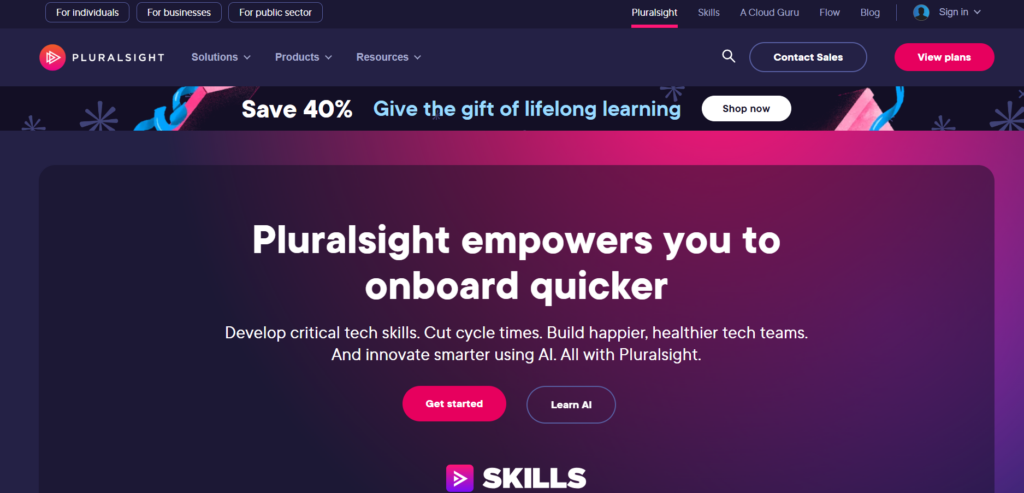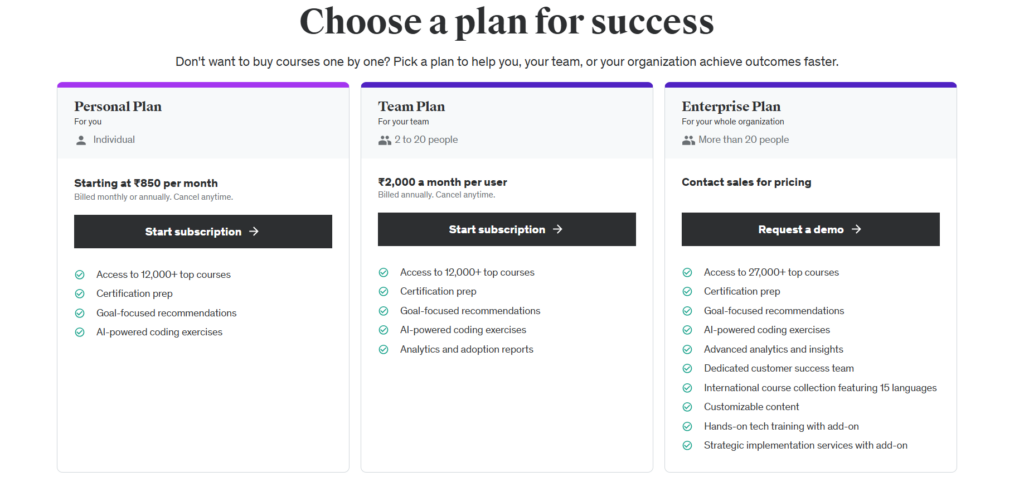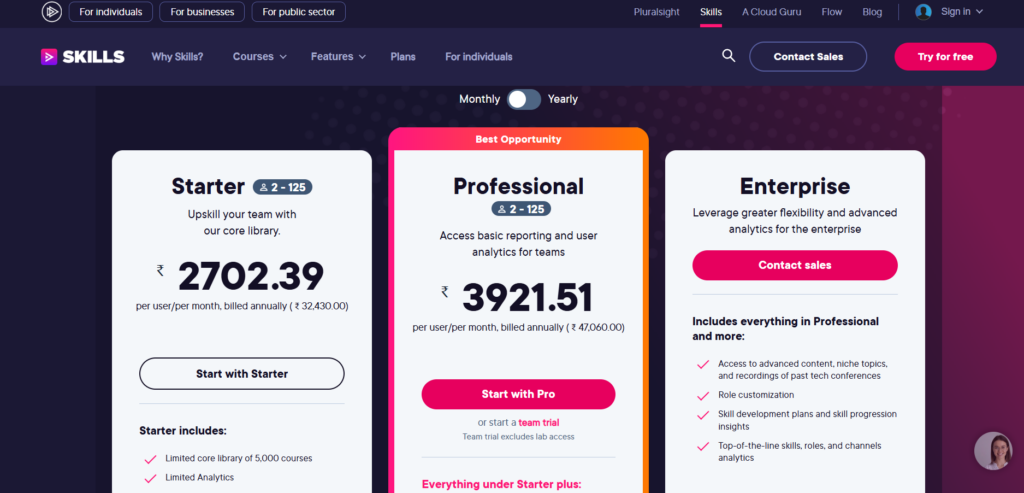Choosing between Udemy and Pluralsight can be tricky, especially if you’re trying to boost your skills or learn something new. I’ve used both platforms and noticed they cater to slightly different needs.
Udemy is great for casual learners. It offers thousands of courses on almost any topic—from coding to cooking. You pay for courses individually, and once you buy them, they’re yours forever.
On the other hand, Pluralsight feels more structured and is perfect for professionals, especially in tech fields like software development, IT, and cybersecurity. It uses a subscription model, offering skill assessments and in-depth learning paths.
So, which is best? It depends on your goals and learning style. If you want affordable, flexible courses, Udemy might win. But for serious, career-focused learning, Pluralsight is a strong choice.
Let’s dive into a full comparison to help you decide!
Udemy
Udemy is a global online learning platform offering courses across diverse fields like technology, business, design, and personal development.

It connects learners with expert instructors through an extensive library of on-demand video courses. Designed for flexibility, Udemy allows users to learn at their own pace, anytime, and anywhere.
Its offerings range from beginner to advanced levels, catering to professionals seeking career advancement, students supplementing their education, or individuals pursuing hobbies. Instructors can monetize their expertise by creating and selling courses.
With affordable pricing, frequent discounts, and a community-driven approach, Udemy democratizes education and empowers individuals worldwide to acquire new skills.
Pluralsight
Pluralsight is a subscription-based online learning platform specializing in technology, IT, and business skills.

It offers courses on topics like software development, data analysis, cybersecurity, and cloud computing, making it ideal for professionals seeking to enhance technical expertise or prepare for certifications.
Key features include skill assessments, personalized learning paths, hands-on labs, and interactive coding exercises for real-world practice.
With content created by industry experts, it delivers high-quality training tailored to tech professionals.
Pluralsight also supports team training with enterprise solutions for businesses. However, its niche focus and subscription model may not appeal to casual learners or those seeking diverse topics.
Features Comparison: Udemy vs Pluralsight
Here’s a comparative chart of the key features of Udemy and Pluralsight, along with reasons why Udemy might be considered better for certain use cases:
| Feature | Udemy | Pluralsight | Why Udemy is Better |
|---|---|---|---|
| Course Variety | Over 200,000 courses across diverse topics, including programming, personal development, business, arts, and more. | Focused on technology and business skills, primarily for professionals in IT, software development, and data analysis. | Broader variety of topics appeals to a wider audience beyond tech professionals. |
| Pricing Model | Pay-per-course model, with frequent discounts and lifetime access to purchased courses. | Subscription-based model with monthly or annual plans, access ends when the subscription lapses. | Flexible pricing and lifetime access provide better value for casual learners or specific skill needs. |
| Course Ownership | Lifetime access to purchased courses. | Access only while subscription is active. | Lifetime access lets learners revisit content anytime without recurring costs. |
| Skill Levels | Suitable for all levels, from beginner to advanced. | Primarily targets intermediate to advanced learners in tech fields. | More inclusive for learners at various skill levels and in non-technical areas. |
| Instructor Diversity | Courses created by a wide range of instructors, including industry professionals and enthusiasts. | Content created by vetted experts, with less instructor diversity. | Broader range of perspectives and teaching styles on Udemy. |
| Interactivity | Standard video lectures with some quizzes and downloadable resources. | More advanced interactivity with skill assessments and hands-on labs (for tech-specific topics). | Simpler structure is more user-friendly for casual learners on Udemy. |
| Certifications | Certificates of completion for each course, not accredited. | Certificates and skill IQ assessments; not accredited either. | Certificates on Udemy serve casual learners who may not need formal credentials. |
| Customization | Freedom to pick individual courses based on interest or need. | Access to all courses with a subscription but no per-course customization. | Better for users who prefer specific courses or topics without committing to a subscription. |
| Languages | Courses available in multiple languages, often with subtitles and translations. | Primarily English content, with limited localization. | Wider language support on Udemy caters to a global audience. |
| Community & Support | Active student reviews and Q&A sections in each course. | Strong focus on professional development, but less community interaction. | Community feedback helps learners choose better courses on Udemy. |
| Trial Period | No free trial but often has free courses or low-cost introductory offers. | 10-day free trial for new subscribers. | Frequent low-cost courses on Udemy make it more accessible for first-time users. |
Pricing Comparison: Udemy vs Pluralsight
Here’s a detailed pricing comparison of Udemy vs. Pluralsight, along with reasons why Udemy may be considered better:
Udemy Pricing

1. Pay-Per-Course Model:
- Courses are individually priced, typically ranging from $10 to $30 during sales (frequent discounts).
- Standard pricing for most courses without discounts is between $50 and $200.
- Lifetime Access: Once purchased, you own the course forever, with no recurring fees.
2. Free Courses:
- Offers a selection of free courses in various categories.
3. No Subscription Commitment:
- No monthly or annual payments required unless choosing optional course bundles or Udemy Business.
Pluralsight Pricing

Pluralsight offers a range of subscription plans tailored to individual learners and businesses, each with specific features and pricing structures.
| Plan | Monthly Price | Annual Price | Key Features |
|---|---|---|---|
| Standard Plan | $29/month | $299/year | – Access to core courses, skill paths, and assessments. – Learning analytics and progress tracking. |
| Premium Plan | $45/month | $449/year | – All Standard features, plus: – Hands-on labs. – Interactive projects. – Certification prep. |
| Team Standard | N/A | $399/user/year | – Includes all Standard features for teams. – Admin analytics. – Role IQ for skills assessment. |
| Team Premium | N/A | $579/user/year | – Includes all Premium features for teams. – Advanced analytics. – Custom learning workflows. |
| Free Trial | N/A | Free for 10 days | – Limited access to all content for new users (no cost). |
Why Udemy is a Better Choice
Udemy offers a pay-per-course model with prices often ranging from $10–$30 (during sales) and lifetime access, making it affordable and flexible. Pluralsight requires a $29–$45/month subscription, with access ending after cancellation. Udemy’s lower cost, broader topic variety, and no recurring fees make it better suited for casual learners and those with specific learning needs.
The Final Verdict
Udemy and Pluralsight are both excellent learning platforms, but Udemy offers more flexibility and accessibility.
Udemy’s massive course library spans diverse topics, from technical skills to personal development, while Pluralsight focuses primarily on tech.
Udemy allows users to purchase individual courses with lifetime access, unlike Pluralsight’s subscription-only model. This pay-as-you-go approach makes Udemy more affordable for casual learners.
Additionally, Udemy’s courses cater to all skill levels, with user reviews and previews ensuring quality. Overall, Udemy’s affordability, variety, and flexibility make it the better choice.
FAQ’s
Which platform is more affordable?
Udemy is more affordable with pay-per-course pricing starting as low as $10 during sales.
Which platform offers lifetime access?
Udemy provides lifetime access to purchased courses, unlike Pluralsight’s subscription model.
Who should use Udemy?
Casual learners, beginners, and those seeking courses in diverse topics beyond tech.
Who should use Pluralsight?
Tech professionals focused on IT, programming, and certifications.
Which is better for flexibility?
Udemy, due to its one-time payment and non-subscription model.


